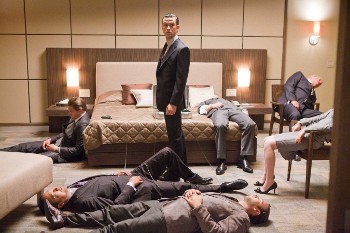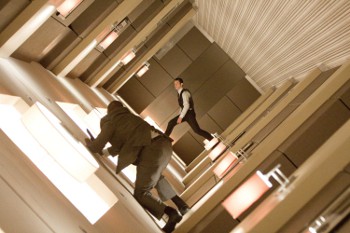Inception
A review/defense/critique of writer/director Christopher Nolan’s Inception. I offer easily digestible bullet points without annoying connective tissue or other elements of coherent argument. (You’re welcome.) The spoiler-sensitive are warned.
Inception Conception
 • Let’s get the bullshit out of the way. Jim Emerson writes:
• Let’s get the bullshit out of the way. Jim Emerson writes:
“[W]hat this movie’s facilely conceived CGI environments have to do with dreaming, as human beings experience dreams, I don’t know. … [T]he movie’s concept of dreams as architectural labyrinths – stable and persistent science-fiction action-movie sets that can be blown up with explosives or shaken with earthquake-like tremors, but that are firmly resistant to shifting or morphing into anything else – is mystifying to me.”
The complaint is fair enough, given that Inception regularly refers to “dreams.” But what’s going on is only marginally related to how “human beings experience dreams.” The movie’s plot concerns espionage that uses as its tool a shared, drug-induced dream-like state with environments created by external “architects.” And if one does a little thinking, one realizes that the technique of the premise is effective only if scientists and practitioners can exercise control over the dreaming – that is, if they eliminate the inherent fluidity, randomness, and chaos.
I understand that if you want to make a good movie about baseball, you need to be true to baseball. But this is a case of sloppy word choice rather than botched fidelity. I suppose the movie could have made up some stupid term for its alternate realities – say, “The Matrix” – but I prefer the simplicity of the inaccurate “dreams.” Bitch about Inception’s presentation of “dreams” all you want, but I think a filmmaker should get a pass on the core narrative given.
• In another piece, Emerson enlists Matt Zoller Seitz in his criticism of Nolan. He quotes Seitz:
“A filmmaker as prosaic and left-brained and non-visual as Nolan should not be making a film about dreams and dreaming.”
I’ll allow that Nolan is a “prosaic” and “left-brained” stylist, and as a left-brained, prosaic writer, I don’t consider those labels inherently derogatory. (I doubt Seitz does, either; of Emerson, I’m not sure.) I can’t imagine that a “non-visual” movie director would get much work, but I think Seitz is trying to restate his belief that Nolan isn’t particularly poetic with his images.
Again, point taken. But Inception doesn’t claim any kinship with Mulholland Dr. I hate to repeat myself, but the ferocity of Emerson’s argument calls for a clear restatement: While Inception is by its own admission about “dreams,” it is not about them in the way that “human beings experience dreams.” Emerson means those words negatively, but they can also be merely descriptive, as a way to clarify the conceit for an audience.
• Emerson’s ultimate issue:
“Nolan makes crafty little puzzle boxes (and sometimes big ones), but they never quite get beyond merely clever. Like Sleuth or The Usual Suspects, they’re not about characters or emotions or ideas or human experience at all; they’re just self-contained gadgets, amusing but mechanical.”
Fine. That’s one thing cinema does particularly well, and no other medium can. The Usual Suspects and Inception work only as movies, and the latter is a stellar example. May we move on now?
Substance
• In the comments section of his Inception post, Emerson reveals his real issue with Nolan’s films:
“They’re inelegant, labored, and just plain no fun!”
Now we’re getting somewhere. I find Nolan’s movies entertaining, but Emerson is entitled to his lack of fun.
Labored? Clearly labored over, and the strain shows in both Batman Begins and The Dark Knight. Inception feels assured and natural to me.
Inelegant? Memento’s gracefulness is hard to dispute, The Prestige is a marvel of misdirection, foreshadowing, fair play, and thematic density, and Batman Begins’ richness is nearly invisible, even though the script is problematic. Inception falls short of Memento’s elegance but eclipses that of any other Nolan feature. As the premise and plot require, there’s a lot of exposition here, but it’s compact enough. And the movie is lean and concise, despite its 149-minute running time.
• Nolan’s best work is characterized by bold, rigorous structures presented with confidence, and Inception’s nested narratives might make it Memento’s formal equal.
• The most amazing component of Inception is its narrative clarity. Confusion is the price of admission, but never unnecessarily. With five-ish levels of story – limbo within a dream within a dream within a dream within reality – the audience is challenged but able to keep up. The Dark Knight lacked shape, but Nolan returns to prime Memento form here – a testament to that left brain of his.
• Roger Ebert claims that Inception “does a difficult thing. It is wholly original, cut from new cloth … .” That’s exceedingly generous, especially given the similarity of Nolan’s movie to David Cronenberg’s eXistenZ.
 • The obvious cinematic reference point for most people will be The Matrix, and it’s a reasonable comparison in terms of unreal realities and their physics. (In The Matrix, the gravity-defying stunts signal the absence of rules; in Inception, they’re an expression of the rules.) But I found the Wachowskis’ visual tricks tiresome and overly showy even in the first movie, and I never cared a lick about what was happening in their world(s). Inception does a good job balancing technical showmanship with an emotional hook and (relatively) human stakes.
• The obvious cinematic reference point for most people will be The Matrix, and it’s a reasonable comparison in terms of unreal realities and their physics. (In The Matrix, the gravity-defying stunts signal the absence of rules; in Inception, they’re an expression of the rules.) But I found the Wachowskis’ visual tricks tiresome and overly showy even in the first movie, and I never cared a lick about what was happening in their world(s). Inception does a good job balancing technical showmanship with an emotional hook and (relatively) human stakes.
• Leonardo DiCaprio’s Cobb isn’t a three-dimensional character, but he’s credible in his obsessions and his cavalier attitude toward the lives and well-being of his team – which is what the story requires.
• The audience with which I saw the movie held its collective breath during the closing shot, waiting and hoping for that top to fucking drop. This wasn’t the suspense of wondering what was going to happen next; it was emotional investment.
• The final shot is, in one way, problematic: If the top doesn’t stop, that really can’t be shown efficiently. So assuming that Nolan did not want to give the audience confidence that Cobb was actually reunited with his children, he had little choice but to make it ambiguous – still spinning, but wobbling.
• It is finally irrelevant wh
ether that cathartic moment is objectively “real.” The movie makes clear that the “dream” state is genuine enough to the person experiencing it; the only thing that matters is that Cobb felt it was happening.
• I like the idea that Cobb, Mal, and Saito have lived adult lifetimes in Inception’s limbo. This plants the seed of doubt about the authenticity of any experience, and makes all experiences authentic in a way. And that’s why the ending works, regardless of whether the top stops spinning.
• Inception is an exceptionally handsome movie. That can’t be directly attributed to Nolan, but he was also a producer, and he has the good sense to continue working with cinematographer Wally Pfister. Nolan might not be a great (or even very good) director, but he has excellent taste in partners in a fundamentally collaborative art.
 • The film doesn’t conform to the liquidity of dreams, but to these eyes the production design is topnotch. Spaces and structures gleaming and crumbling are rendered meticulously and gorgeously.
• The film doesn’t conform to the liquidity of dreams, but to these eyes the production design is topnotch. Spaces and structures gleaming and crumbling are rendered meticulously and gorgeously.
• Casting Director John Papsidera has assembled another embarrassment of riches for Nolan. Marion Cotillard, Joseph Gordon-Levitt, and Tom Hardy breathe a lot of life into thin characterizations, and DiCaprio’s typically evident hard work isn’t a liability.
• How long was that van falling from the bridge? Half an hour? An hour? A really cool, really simple gag that helped tell the story visually.
Complaints
• Based on Inception and The Dark Knight, it’s clear that Nolan is not presently capable of choreographing and directing action scenes that audiences can follow. That’s a shame, but he has a lot of company.
• I can’t find it, but somebody wondered why Cobb’s children couldn’t just fly out of the United States to see him. Good point, and I don’t think it would have been that hard to make clear that Mal’s mother would never allow it; one can infer that, but given how the kids drive Cobb’s actions, something a little more explicit would have been appropriate.
• Bride of Culture Snob noted without judgment how Saito’s stated goal is altruistic by being anti-monopolistic. I would have liked his explanation trimmed so that he simply said his company could no longer compete. If Cobb gets what he wants, he wouldn’t care if Saito were a cackling villain intent on taking over the world! There’s already plenty of evidence that Cobb is as self-centered as they come, and muddying motivation would make Saito more interesting.
• I wonder why DiCaprio did both Inception and Shutter Island considering the similarities of theme, structure, reveal, and central character.
• Dream projections are the worst shots since the villains in The A-Team TV show. That’s a staple of action movies, but it’s distracting in Inception.
• Nolan does himself no favors by employing elevators (to go deeper into the mind) and safes (to hold secrets). The literalness of those metaphors is great ammunition for critics who dislike his left-brained, prosaic approach.


I think Leonardo DiCaprio worked on both this and “Shutter Island” due to his apparent credo of collaborating with top filmmakers.